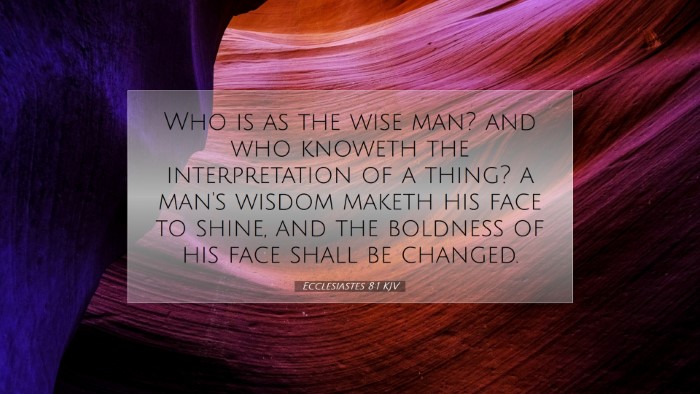Commentary on Ecclesiastes 8:1
Verse: "Who is as the wise man? and who knoweth the interpretation of a thing? A man's wisdom maketh his face to shine, and the boldness of his face shall be changed." (Ecclesiastes 8:1)
Introduction
The book of Ecclesiastes presents a profound exploration of the nature of life, wisdom, and the human condition. In Ecclesiastes 8:1, the author reflects on the exalted nature of wisdom and its transformative power.
Textual Analysis
This verse begins with a rhetorical question that emphasizes the rarity and value of wisdom. The existential inquiry leads to an observation about the effect wisdom has on one's demeanor and countenance.
Who is as the wise man?
Matthew Henry notes that the wise man possesses a clarity of thought that allows him to navigate life's complexities. The author's question serves to highlight the unique stature of the wise individual, raising awareness of wisdom's importance in discerning life’s challenges.
Who knoweth the interpretation of a thing?
Albert Barnes observes that understanding the deeper meanings of life situations is integral to wisdom. This phrase confirms that true wisdom involves not just knowledge but the ability to interpret circumstances correctly. The wise are not merely seekers of knowledge but also interpreters of the human experience.
A man's wisdom maketh his face to shine
Adam Clarke expounds that wisdom radiates outwardly, impacting one's personality and presence. A wise individual often reflects tranquility and confidence, which can be likened to a glowing countenance. This glow symbolizes inner peace, comprehension, and moral fortitude.
And the boldness of his face shall be changed
This part of the verse speaks to the transformative impact of wisdom not just on an individual’s appearance but on their boldness and demeanor. Matthew Henry comments that wisdom fosters humility and self-awareness, causing the proud to become more meek and approachable. Alternatively, the wise person finds assurance, leading to a healthy assertiveness as they navigate life.
The Nature of Wisdom
The quest for understanding and wisdom is emphasized throughout the Scriptures, particularly in Proverbs and Ecclesiastes. Wisdom is seen as a divine gift, one that brings about significant changes in the life of the possessor.
- Divine Origin: Wisdom is understood to come from God. James 1:5 invites believers to ask God for wisdom, indicating that true insight originates from divine revelation.
- Influence on Life: The wise live differently; their choices are informed by understanding and discernment, leading to a more fulfilled and meaningful life.
- Impact on Relationships: Wisdom affects relational dynamics; the wise are generally more harmonious, earning the respect and trust of others.
The Practical Applications of Wisdom
In light of Ecclesiastes 8:1, several practical applications emerge for pastors, students, theologians, and Bible scholars:
- Seek Wisdom: Engage earnestly in the pursuit of wisdom through prayer, study, and reflection on God's Word, as it is vital for spiritual growth and effective ministry.
- Interpret Life’s Events: Teach others the importance of discerning the lessons and meanings behind life experiences, fostering deeper understanding among congregants and peers.
- Radiate Wisdom: Encourage the cultivation of wisdom such that it becomes evident in one’s life, affecting interactions and serving as a light to others.
- Embrace Transformation: Recognize that wisdom can lead to personal transformation, reshaping one's character and approach to adversity, thus fostering resilience and grace.
Conclusion
Ecclesiastes 8:1 serves as a poignant reminder of the extraordinary value of wisdom. It calls for reflection on its significance in our lives and the lives of others. As we seek wisdom and allow it to shape our character, we, too, can experience the change it brings, not just in our own countenance but in our relationships and ministries. Through the insights from Matthew Henry, Albert Barnes, and Adam Clarke, we are urged to embrace the pursuit of wisdom as a lifelong endeavor—one that ultimately leads to a life that reflects the glory of God.


